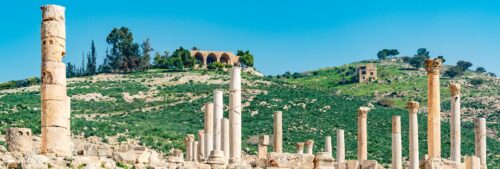While visiting the city of Irbid in the North of Jordan, it wouldn’t be reasonable to miss a trip to the archeological site of Pella. The site is set in a fold of hills that overlook the Jordan Valley, one short drive from the town of Tabaqat Fahl, and an hour and a half drive from Amman. The former ancient city of Pella hosts a collection of ruins that date back over 6000 years and is regarded as one of the most important historical landmarks in the country where visitors can experience fascinating glimpses of many of Jordan’s key historical periods.
Pella has one of the longest pre-classical histories of any site in Jordan as it offers something to discover for everyone’s interests, and is best known for its classical theater, bath house, nymphaeum and Late Antique remains (at least three churches, a mosque, domestic houses). Pella quickly became one of the cities of the Decapolis, the collection of Roman trade towns connected by paved roads which included Philadelphia (Amman), Gadara (Umm Qais), and Gerasa (Jerash). This confederation of towns lasted until the Abbasids moved the center of the Muslim world to Baghdad

